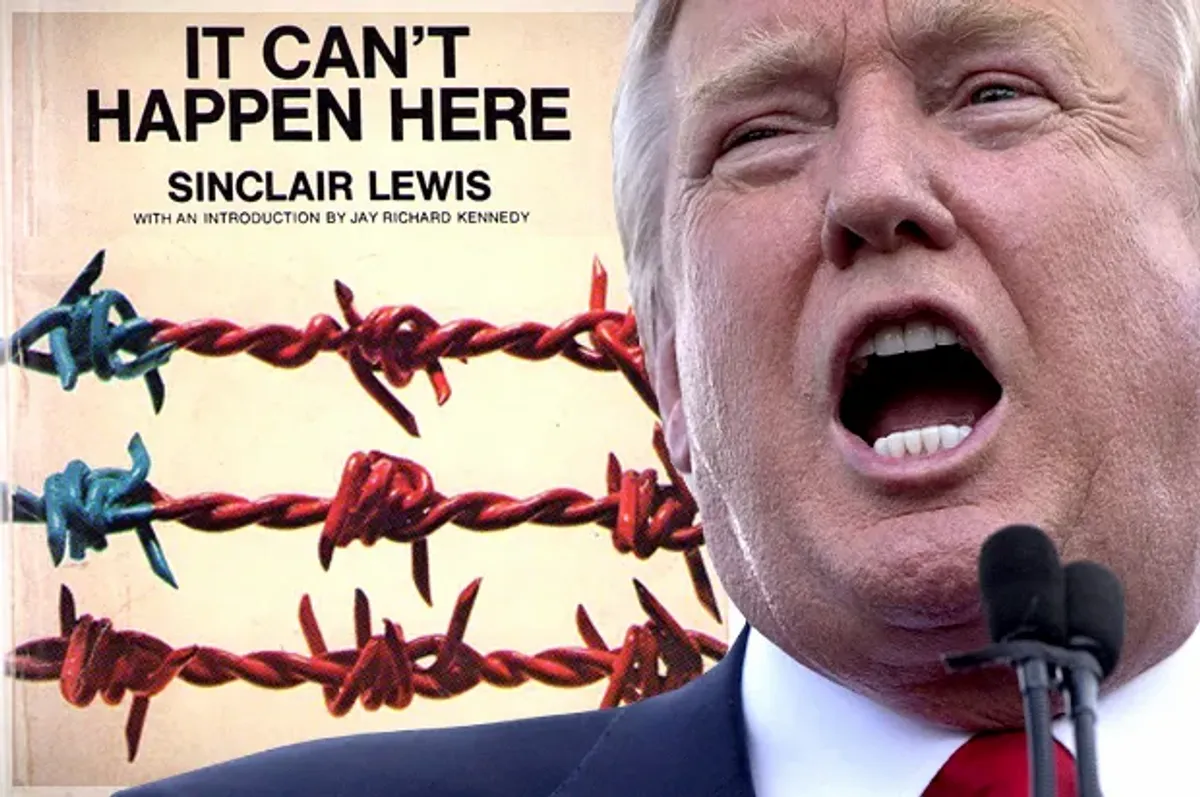Like I’ve said before, I’m a systems thinker, and patterns across history, fiction, and political thought really resonate with me. Lately I’ve been working my way back through various books I have that feature resistance narratives, especially ones where people see the warning signs before others do. Orwell, Huxley, Roth – before them all, Sinclair Lewis handed America its own mirror.
Published in 1935, It Can’t Happen Here isn’t exactly a subtle book. It’s not trying to be. It’s a warning shot from a guy who saw fascism spreading like mold across Europe—and realized America had the same damp rot underneath the wallpaper. So he gave us Buzz Windrip: a folksy, mean-spirited, Bible-thumping demagogue who rises to power by promising to make America great again (literally—he runs on a platform of “traditional values,” nationalism, fear of the “other,” and plenty of vague shouting about freedom). Then, once elected, he guts the Constitution, turns the press into a punching bag, empowers militias, and crushes dissent beneath a tidy façade of “law and order.”
It reads like a bad fever dream now. Or a Twitter feed from 2016. Or this morning.
Because Lewis wasn’t speculating. He was observing. And almost 90 years later, here we are. Again. Still pretending this is all new. Still waiting for a plot twist that isn’t coming.
We don’t need a reboot. We’re already deep into the sequel.
1. The Cult of Personality in a Cardboard Suit
Windrip is loud, needy, performative, full of slogans and short on coherence. He collects yes-men. He throws tantrums. He values loyalty above competence or truth. His followers don’t care that he’s incoherent, hypocritical, or dangerous. They love that he makes them feel like they matter—like they’re part of something strong, simple, righteous.
Sound familiar?
Trump didn’t invent this archetype. He just draped it in gold lamé and broadcast it in 4K. It’s not about what he does—it’s how he feels to them. Like vengeance. Like safety. Like someone finally saying the quiet part out loud, even when it doesn’t make any damn sense.
This is what Lewis understood: fascism doesn’t require intellectuals. It requires emotional momentum.
2. The Weaponization of “Ordinary”
One of Lewis’s most disturbing points—and it was deliberate—is how ordinary fascism looks on the surface. It’s not goose-stepping soldiers at your door (not at first). It’s politicians quoting scripture and peddling nostalgia. It’s flags on the lawn and “common sense” in the mouth of someone who seems like they could be your uncle.
Buzz Windrip was homespun. Folksy. Full of aw-shucks charm. His fascism came wrapped in red, white, and blue—and that’s exactly what made it hard to fight. Because it didn’t look like danger. It looked like home.
Trumpism runs on the same engine. “We’re just telling the truth.” “We’re protecting families.” “We’re standing up for real Americans.” It’s a story people want to believe, even when it’s hollow. Especially when it’s hollow. Because filling in the blanks feels empowering.
And once they’ve bought in, they don’t just accept the authoritarianism. They cheer it on.
3. The Collaborators Are the Comfort Seekers
In Lewis’s novel, the true villains aren’t just the fascists. They’re the respectable people who accommodate them. The newspaper editors who tone down their criticism. The moderates who believe the system will correct itself. The people who shrug and say, “It won’t be that bad.”
They’re the ones who believe democracy can’t be undone—not really. That the Constitution is somehow self-enforcing. That “adults in the room” will save us.
How many times have we heard that?
We watched family separation at the border become policy. We watched courts get stacked, elections questioned, a violent coup attempt brushed aside like a policy dispute. And we watched good, reasonable people rationalize it all—because admitting the truth felt too dangerous.
Fascism doesn’t need your loyalty. It just needs your reluctance to make a scene.
4. Control the Story, Control the World
Windrip wastes no time gutting the press. Dissent becomes sedition. Truth becomes a weapon to suppress. And once the official story becomes the only story, resistance becomes incoherent noise.
Trump didn’t need to jail journalists. He just made enough people stop believing them. He shouted “fake news” until truth became partisan. He flooded the airwaves with so much contradiction that nothing stuck. Reality turned into opinion.
Lewis didn’t predict Twitter. He didn’t have to. He understood that when people stop trusting any shared version of reality, they’ll follow the loudest voice in the room. Or the angriest. Or the one that tells them their anger is noble.
That’s not just propaganda. That’s infrastructure.
5. Middle-Manager Fascism
Windrip doesn’t rule alone. He delegates the cruelty. Local sheriffs. Party enforcers. Petty tyrants in freshly ironed uniforms. People who want order more than justice. People who just want to keep their jobs.
There’s a scene where a quiet, rule-following official helps round up dissidents—not out of hatred, but habit. Out of fear. Out of the belief that “someone has to do it.”
We see this now. Teachers forced to censor themselves. Librarians getting death threats. Border agents separating families, not because they’re monsters, but because the system trained them to do it and punished them if they didn’t.
Lewis wasn’t warning about jackbooted thugs. He was warning about bureaucrats. Middle-class authoritarians with clean hands and plausible deniability.
Fascism doesn’t need stormtroopers. It just needs a workflow.
6. Resistance Happens—Eventually
The protagonist, Doremus Jessup, is a journalist. He sees what’s happening. He doesn’t like it. He speaks out—quietly at first, then louder. But by the time he’s ready to act, it’s too late to stop the slide. The machinery is already humming.
He hesitates because he wants to believe things will get better. That people will wake up. That someone else will fix it.
That’s us. Right now. Half-asleep and hoping the dream ends on its own.
But eventually, Jessup stops hoping and starts resisting. Not because he’s brave. Because there’s no other choice left. That’s the arc we’re on too—if we’re honest.
The question isn’t whether we’ll have to fight back. The question is how late we’ll be when we finally do.
7. We Knew. We Just Didn’t Listen.
Lewis wasn’t trying to be prophetic. He was trying to be obvious.
He watched the rise of fascism overseas. He saw American business leaders cozy up to Hitler. He heard the chants of white nationalism in his own country. He watched churches and newspapers flirt with authoritarian control, and he said: This can happen here.
And we laughed.
Now we’re the punchline.
We don’t get to say we weren’t warned. We were. Loudly. Repeatedly. Elegantly.
The question isn’t “could it happen?” It’s “how much worse will we let it get before we admit it already has?”
If you feel out of step, like something’s wrong but nobody wants to talk about it—that’s not anxiety. That’s clarity. That’s your soul refusing to adapt to bullshit.
Hold on to that.
Because Lewis gave us the map. The warning. The whole damn playbook.
We’re out of excuses. Let’s stop writing sequels.


